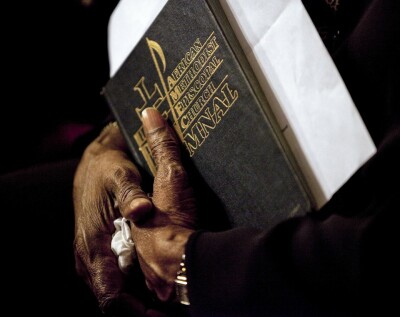Can Christians practice 'Mindfulness'?
"Mindfulness" has been a Buddhist practice for centuries, and some Christians might be wondering if they, too, can practice it. An Episcopal priest has addressed the question and has said that it depends on the reason behind its practice.

"If you take up mindfulness not to enhance but to replace religion, if its appeal is because of its non-threatening, inoffensive, benign nature, while I have no doubt you will still enjoy mental and physical benefits from it, you are likely to end up spiritually disappointed," Rev. V.R. Marianne Zahn wrote on RevZ.
According to Zahn, mindfulness is not Christian, but it not anti-Christian either. There is no reason for it not to be part of Christian practice, although one should "view it with a hermeneutic of suspicion" before getting into it.
Explaining mindfulness, Zahn says that it is, in its most basic form, simply being aware of the present moment. It does not require creeds, mantras, gurus, poses, and such like. Thus, she explains, it can by practiced by anyone of any religion or of no religion, without causing offense. She also said that this mental focus can be seen in Christian traditions, although with Christianity, it is more on putting the mind on sacred texts or icons "which then facilitates a deeper understanding and/or felt experience of God."
The practice of mindfulness can retrain a person's mind to see what is present at the moment "without all the personal and cultural baggage that our constructs of God have accumulated over the millennia," she explains.
"If we wish to know God, we must strip away everything we think we know and are supposed to feel and come to the encounter afresh, or else we are not really understanding God but only the idea of God we have inherited from others," Zahn wrote. "For this reason, I would urge any Christian, even if they are already engaged in contemplative practices, to learn and practice mindfulness as a way of cleansing their minds of automatic conditioned responses that actually inhibit our understanding of God rather than enhance it."
However, she warned, if one is using mindfulness as a replacement to religion rather than something to enchance it, then they are likely to be disappointed spiritually. She said that some people are looking for practices that would fill a spiritual void, and they find mindfulness as a means to fill it. However, the restlness would not be gone for long and they would "eventually search for something deeper, something that not only quiets their minds, but enlarges their spirits." Religion, meanwhile, challenges a person to grow, and it is in facing those challenges that a person develops character.
Mindfulness is being used in some workplaces and schools to alleviate stress, and some doctors reportedly recommend it for some patients.
 Christians don't have to affirm transgenderism, but they can’t express that view at work: tribunal
Christians don't have to affirm transgenderism, but they can’t express that view at work: tribunal Archaeology discovery: Medieval Christian prayer beads found on Holy Island
Archaeology discovery: Medieval Christian prayer beads found on Holy Island Presbyterian Church in America votes to leave National Association of Evangelicals
Presbyterian Church in America votes to leave National Association of Evangelicals Over 50 killed in 'vile and satanic' attack at Nigerian church on Pentecost Sunday
Over 50 killed in 'vile and satanic' attack at Nigerian church on Pentecost Sunday Ukrainian Orthodox Church severs ties with Moscow over Patriarch Kirill's support for Putin's war
Ukrainian Orthodox Church severs ties with Moscow over Patriarch Kirill's support for Putin's war Islamic State kills 20 Nigerian Christians as revenge for US airstrike
Islamic State kills 20 Nigerian Christians as revenge for US airstrike Man who served 33 years in prison for murder leads inmates to Christ
Man who served 33 years in prison for murder leads inmates to Christ


 Nigerian student beaten to death, body burned over ‘blasphemous’ WhatsApp message
Nigerian student beaten to death, body burned over ‘blasphemous’ WhatsApp message 'A new low': World reacts after Hong Kong arrests 90-year-old Cardinal Joseph Zen
'A new low': World reacts after Hong Kong arrests 90-year-old Cardinal Joseph Zen Iran sentences Christian man to 10 years in prison for hosting house church worship gathering
Iran sentences Christian man to 10 years in prison for hosting house church worship gathering French Guyana: Pastor shot dead, church set on fire after meeting delegation of Evangelicals
French Guyana: Pastor shot dead, church set on fire after meeting delegation of Evangelicals ‘Talking Jesus’ report finds only 6% of UK adults identify as practicing Christians
‘Talking Jesus’ report finds only 6% of UK adults identify as practicing Christians Mission Eurasia ministry center blown up in Ukraine, hundreds of Bibles destroyed: 'God will provide'
Mission Eurasia ministry center blown up in Ukraine, hundreds of Bibles destroyed: 'God will provide' Church holds service for first time after ISIS desecrated it 8 years ago
Church holds service for first time after ISIS desecrated it 8 years ago Burger King apologizes for 'offensive campaign' using Jesus' words at the Last Supper
Burger King apologizes for 'offensive campaign' using Jesus' words at the Last Supper Uganda: Muslims abduct teacher, burn him inside mosque for praying in Christ’s name
Uganda: Muslims abduct teacher, burn him inside mosque for praying in Christ’s name